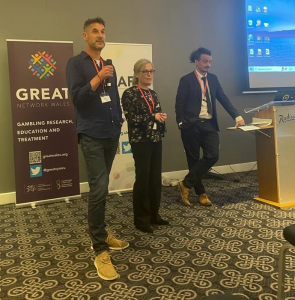by rbartels | Jun 30, 2022 | Conferences / Events
 On the 19th and 20th May 2022, Prof Amanda Roberts hosted the ‘Current Advances in Gambling Research‘ (CAGR) Conference in Cardiff, along with Colleagues from Kings College London and the University of Swansea.
On the 19th and 20th May 2022, Prof Amanda Roberts hosted the ‘Current Advances in Gambling Research‘ (CAGR) Conference in Cardiff, along with Colleagues from Kings College London and the University of Swansea.
The conference was a great success, with speakers and attendees from all around the world.
Also, FCRG members Lauren Smith and Tochs Onwuegbusi gave presentations. Furthermore, 3rd year undergraduate student Ben Hookway was invaluable in assisting Amanda and her team both before and throughout the conference.
The next CAGR conference will be held at the Royal Society in London (at the end of June 2023), so watch this space! If you would like to find out more about it, please get on touch with Amanda at aroberts@lincoln.ac.uk.
by rbartels | Jun 30, 2022 | Conferences / Events
On the 17th May, Dr Lauren Smith presented her work on the lived experiences of crime and gambling at the ‘HMPPS Insights 22 Festival’ session entitled Exploring People’s lived Experiences of Crime and Gambling Harms.
by rbartels | Jun 30, 2022 | Publications
 In May, Elizabeth Deehan (PhD student), along with Ross Bartels, published a new qualitative study examining somnophilia and dormaphilia in the Sexual Abuse journal.
In May, Elizabeth Deehan (PhD student), along with Ross Bartels, published a new qualitative study examining somnophilia and dormaphilia in the Sexual Abuse journal.
Deehan, E. T., & Bartels, R. M. (2022). A qualitative exploration of sleep-related sexual interests: somnophilia and dormaphilia. Sexual Abuse, 10790632221098359.
Abstract
Somnophilia is an under-researched paraphilia. Consequently, there are discrepancies in its definition and conceptual understanding. Also, literature regarding the sexual interest in being asleep during sexual activity (dormaphilia) is even more limited. As such, there is a need to understand these paraphilias more deeply. This study recruited 232 participants online to discuss the content, origin, sexual appeal, emotional appraisal, and behavioural enactment of their somnophilic and dormaphilic interests and fantasies. A Thematic Analysis led to the identification of four main themes: (1) Relevance of Sleep State; (2) Roles within Sleep Sex; (3) Enactment of Sleep Paraphilia and (4) Lack of Consent and Awareness. These four themes spanned across both those reporting somnophilic and dormaphilic fantasies. The Discussion explores the multi-faceted nature of the interests, and implications for the understanding of somnophilia and dormaphilia. This study provides the first qualitative exploration of sleep-related paraphilias, opening avenues for future research and practice.
by rbartels | Jun 30, 2022 | Conferences / Events
On May 19th 2022, The work of Hannah Merdian’s research group (onlinePROTECT) was showcased via a video at the Stop it Now! Flanders (Belgium) anniversary symposium entitled “Beyond stigma: 5 years Stop it Now”.
by rbartels | Jun 30, 2022 | Funding Success
In May 2022, Lauren Smith, along with colleagues Lyndsey Harris and Lauren Hall (School of Social and Political Sciences) were awarded £20,000 by The Probation Service and The Leicestershire Office of the Police and Crime Commissioner.
The funding is being used to develop a model of co-production for women experiencing complex needs.
 On the 19th and 20th May 2022, Prof Amanda Roberts hosted the ‘Current Advances in Gambling Research‘ (CAGR) Conference in Cardiff, along with Colleagues from Kings College London and the University of Swansea.
On the 19th and 20th May 2022, Prof Amanda Roberts hosted the ‘Current Advances in Gambling Research‘ (CAGR) Conference in Cardiff, along with Colleagues from Kings College London and the University of Swansea.
